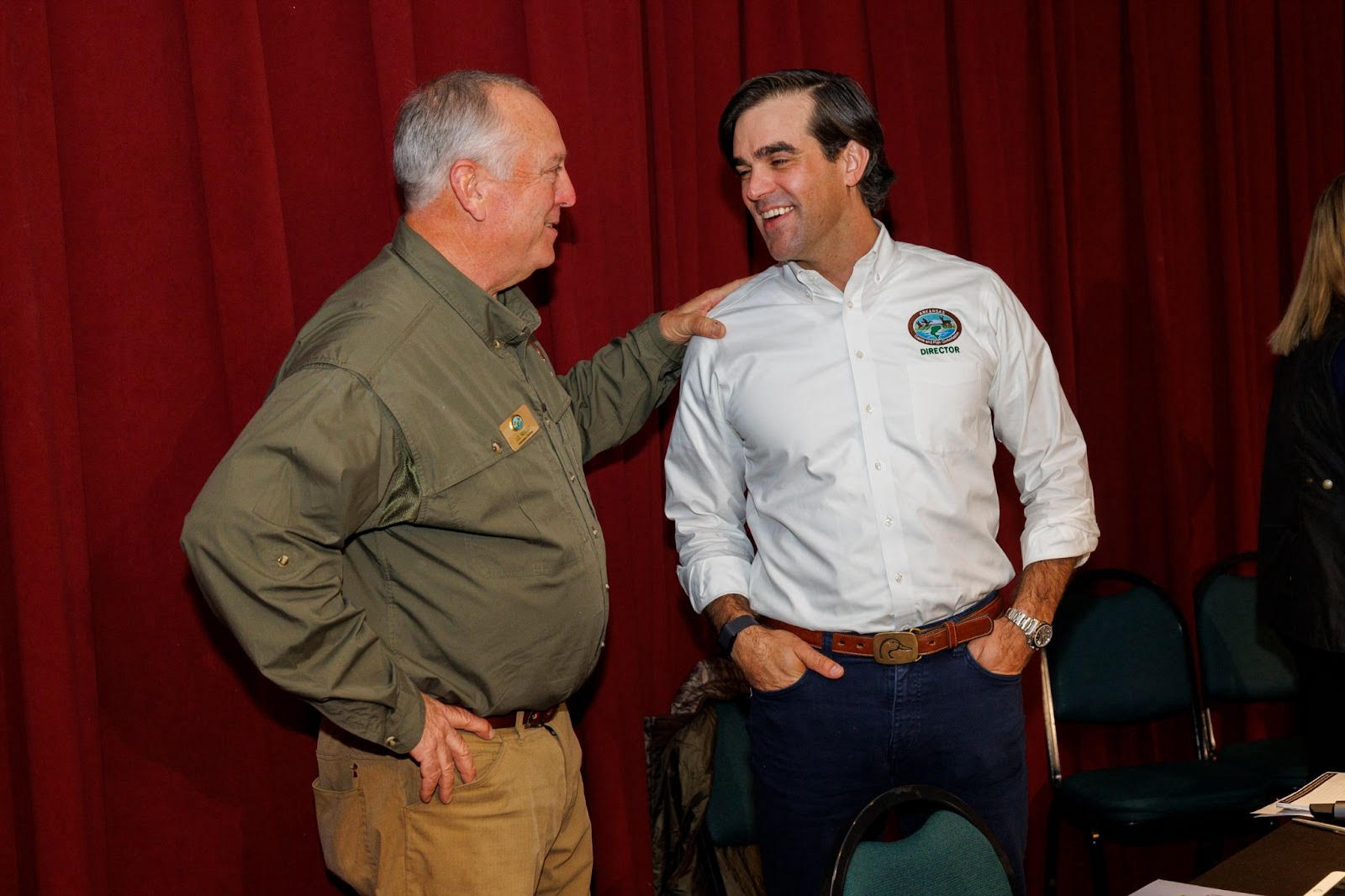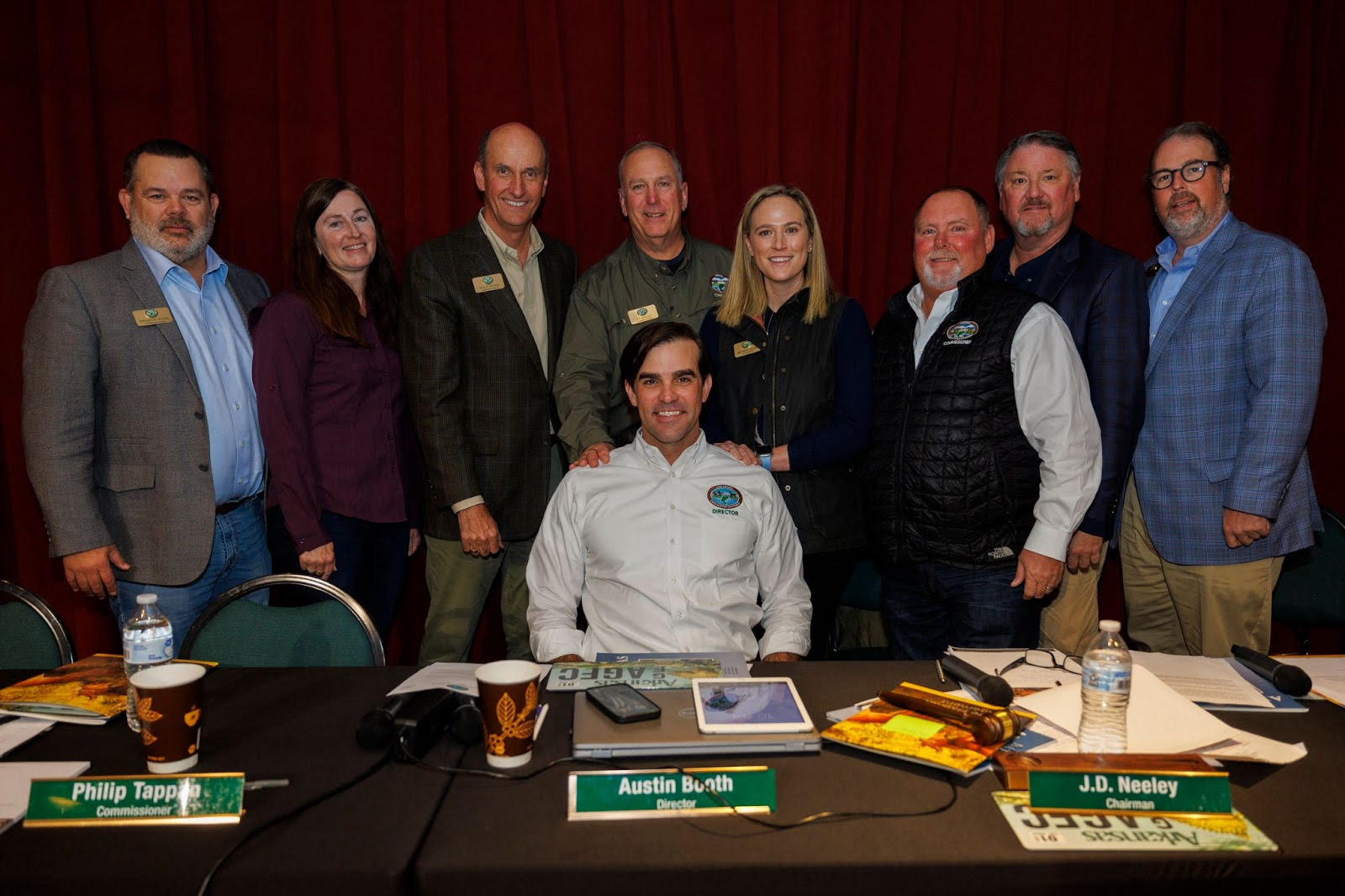

|
Arkansas Game and Fish Commission Director Austin Booth tendered his resignation during Thursday’s monthly commission meeting at the Ozark Folk Center Visitor Center auditorium. Booth’s resignation becomes effective Jan. 4, 2025. He’s been the AGFC director since 2021.
Booth explained that the commitments of his family and faith had to be balanced with the duties of his position at the AGFC over the last three and a half years, and he wished to be able to devote more time to his family and allow someone else to take the reigns of the agency with the intensity needed to continue moving forward in the pursuit of conservation.
“I want to thank my wife and my kids and my mom and dad and my in-laws … for keeping me grounded, for their encouragement and for making sacrifices so I can be effective,” Booth said. “It has been an incredible three and a half years and I have no people to thank more than my family.”
Booth said he will be transitioning to the private sector after 13 years of commitment to his country and state.
AGFC Commission Chairman J.D. Neeley thanked Booth for his service and dedication to the men and women who enjoy and depend upon Arkansas’s natural resources.
“On behalf of the other commissioners and the staff of the Arkansas Game and Fish Commission, I want to thank Austin Booth, our director, for the last three and a half years of tireless dedication to the Commission and the people of the great state of Arkansas,” Neeley offered in a statement following the announcement. “There’s a saying, ‘Iron sharpens iron.’ His leadership has taken a tremendously skilled group of staff and strengthened our ability to put habitat and people first. His motto, ‘See you in the field,’ meant he had his sleeves rolled up and wanted to lead by example — a true servant leader.”
Neeley said Booth’s hiring in 2021 was one of the best decisions the Commission had made in his seven-year term as a commissioner. His role in the development of the agency’s five-year strategic plan, “The Natural State Tomorrow,” has left not only a footprint of success to build upon, but a blueprint to address the future of conservation in Arkansas.
“Booth’s plans and leadership will impact all hunters, anglers and conservationists; those present now and those yet to be born,” Neeley said. “While we are deeply saddened by his departure, we wish him and his family all the best and success in their future endeavors.”
In the last three years, Booth’s leadership has driven the AGFC to a level of performance and accountability never before seen in such a short period of time. The Natural State Tomorrow was only one of many milestones highlighting his time at the Commission. “People first, habitat always,” was a mantra often spoken during Booth’s presentations. He not only spoke these words, but lived them. In his first year at the AGFC, Booth took the challenge of restoring the AGFC’s famous greentree reservoirs head on, reinvigorating the efforts staff had placed in ensuring these valuable habitats continued to produce hunting memories for generations to come. He spoke to crowds at events promoting the AGFC’s actions, not preaching from a pulpit, but standing among the men and women he served.
“Would you rather stand here years from now and tell your grandchildren how great the duck hunting used to be, or have your grandchildren come to you and tell you how great the duck hunting is for them,” Booth would ask.
Tackling legacy issues was a common theme in Booth’s tenure as AGFC director.
The continued decline of aquatic habitat and infrastructure on Craig D. Campbell Lake Conway Reservoir was looming during the last decade. Never one to shrink from a challenge, Booth stepped up to the plate and convinced the Commission that a full-scale renovation was needed. Not only will the 76-year-old infrastructure be completely revamped to better accommodate water levels without manually lifted gates, but the entire lake is seeing a renewal. Nearly 30 miles of boat lanes will be upgraded to increase navigation safety, massive habitat projects will be completed to increase spawning, and brood-rearing habitat for fish and vegetation will grow along the lakebed to create a “new lake” effect, boosting productivity for the forage and game fish that will be stocked upon the lake’s return.
Stocking of fish saw a major turning point thanks to Booth’s vision as well. Thanks to his pursuits, Titan MAXX bass were stocked for the first time anywhere in a public reservoir. These thoroughbred Florida bass were chosen to be part of the building blocks of the newly restored Lake Monticello, another AGFC achievement that reached fruition during Booth’s time. A partnership with Red Hills Fishery of Georgia will ensure this same quality trophy bass will continue to be used in AGFC bass management and will be some of the first game fish to be placed into Lake Conway upon its completion as well.
The agency also saw a huge expansion in the state’s bear season, opening most of southwest and south-central Arkansas to bear harvest for the first time in modern history. He also tasked the agency’s Wildlife Management Division with a groundbreaking telemetry research project and developed a funding model for the technology needed to support this research through donations by Blood Origins to provide GPS collars to track and monitor bears in the newly opened zones during the inaugural season.
The entire structure of the AGFC saw many improvements during the last three years as well. Booth’s vision to elevate habitat enhancement on private land throughout the state as well as his commitment to grow recreational shooting in Arkansas prompted the development of two new divisions focused on these goals.
The Private Lands Habitat Division has hit the ground running, increasing habitat quality on private land throughout the state and championing many of the AGFC’s successful new initiatives. In the last five years, the agency’s Waterfowl Rice Incentive Enhancement Program has ballooned from 10 hunting locations to more than 65 spread across the state. Booth also pursued a special set-aside fund from the Arkansas General Assembly in 2023 which created the AGFC’s Conservation Incentive Program to deliver $3.5 million to private landowners for habitat work on their property.
“Private landowners hold nearly 90 percent of the land in Arkansas,” Booth said. “If we do an absolutely perfect job on all the land we manage at the AGFC, we’re still only improving 10 percent of what is possible. This program and division are here to change that.”
As for recreational shooting the Arkansas Youth Shooting Sports, Archery in the Schools and AGFC Shooting Range programs were all mainstays in the agency’s Education Division, but Booth had the forethought to break these programs into a standalone division to increase visibility and focus on the contributions recreational shooters provide to conservation.
“Shooting sports is absolutely integral to hunting, but recreational shooters contribute so much more to conservation even if they never set foot in the woods,” Booth said. “The money derived from firearms and ammunition sales funds conservation on its own through Pitman-Robinson excise taxes. We want to support those men and women as much as they support conservation.”
In his closing address, Booth thanked the Commission, staff and many partners who make conservation work possible in The Natural State.
“I have always called Arkansas home, even when I didn’t live here for 15 years,” Booth said. “I love this state so much and I always knew that it had so much to do with the hard work of the Arkansas Game and Fish Commission. Thank you so much to our staff and commissioners for letting me be a part of that even if it was just for three and a half years.
“I will let history and the next director say whether I’ve left it better than I found it,” Booth said as he closed. “But I do know that y’all have left me better than I was three and half years ago. Thank y’all, and I’ll see you in the field.”
In other business, the Commission:
A complete video of the meeting is available on the AGFC’s YouTube channel